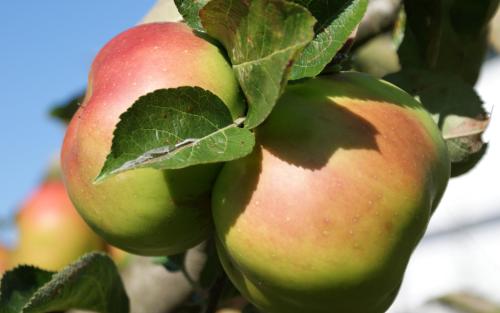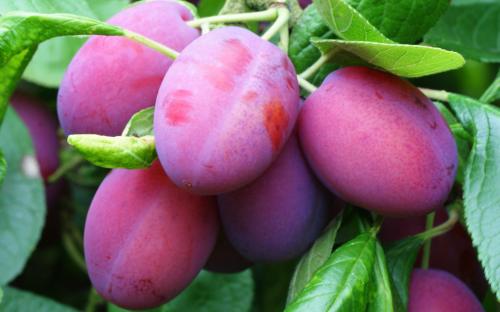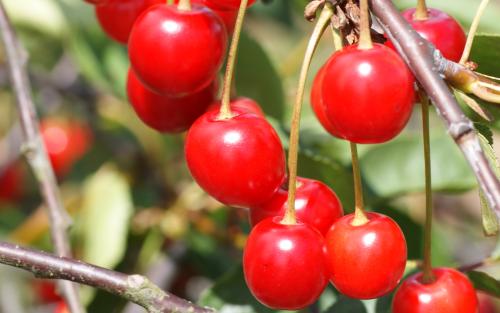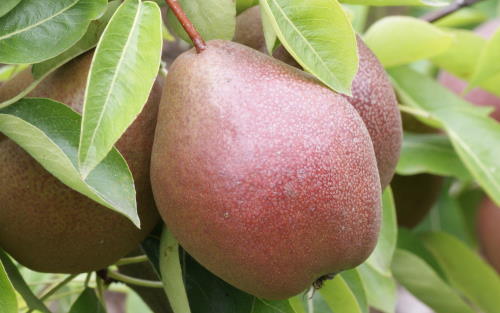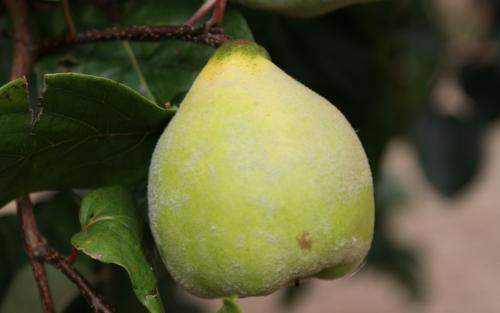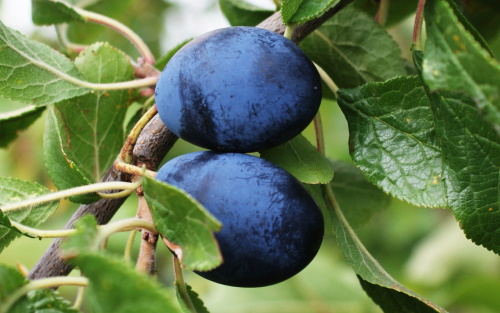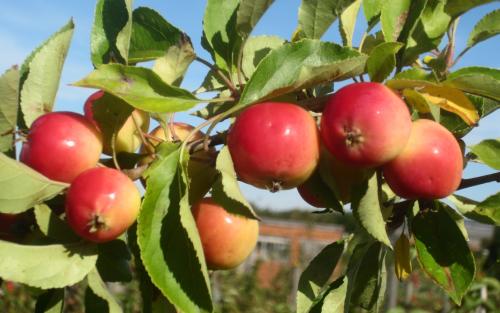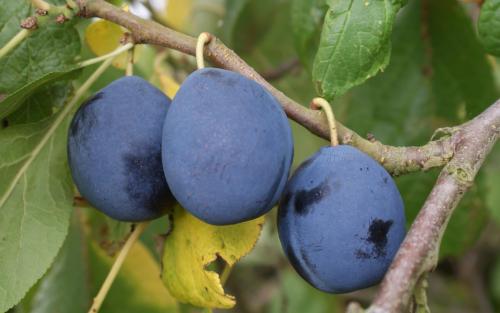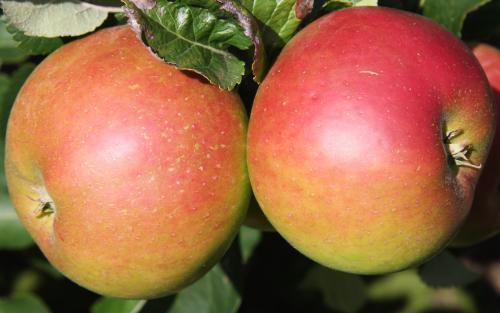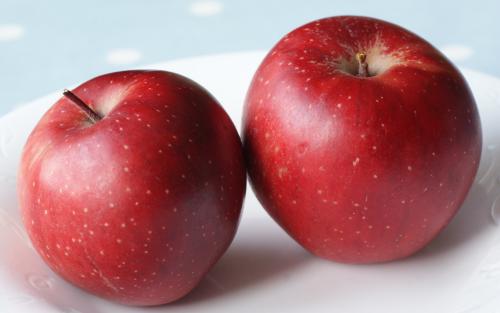Top 10 fruit trees for cooking with
Whether it is apple pie, plum crumble, cherry tart, poached pears, damson jam, or crab apple jelly - here are our recommendations for the best fruit tree varieties for cooking with. These varieties make the ideal present for cooks and chefs and food connoisseurs.
1st Apple trees - Bramley's Seedling
Buy Bramley's Seedling apple trees hereNo cook should be without a Bramley apple tree. This single variety has come to define English apple cookery. The copious acidity of these apples ensures they cook down into smooth puree, with a rich sharp flavour.
Bramley trees are available in a range of sizes to suit any garden, and the blossom is also very pretty.
If you want something more unusual have a look at Arthur Turner, Howgate Wonder, or Peasgood's Nonsuch.
2nd Plum trees - Victoria
Buy Victoria dual-purpose plums hereWe make no apology for including Victoria in this list. It really is one of the best plums for cooking with. Victoria plum jam has a luscious orange colour, and a rich tangy flavour, often with a hint of almond.
Victoria plum trees are not particularly disease-resistant, so it is best to avoid pruning altogether as pruning can introduce disease. However they are vigorous, self-fertile, and very productive. For best fruit size try to thin the fruitlets in late spring. Pick the plums when they are slighly under ripe to get the best flavour in the kitchen.
3rd Cherry trees - Morello
Buy Morello sour cherry trees hereIf you want to cook with cherries you will soon find that regular sweet cherries are no good. What you need are sour cherries - it is the acid in these cherries which responds to heating and cooking.
Morello is the traditional English acid or sour-cherry. It is self-fertile, and easy to grow.
Another advantage is that it is one of the few fruit trees that can be grown productively in north-facing situations, where there is less light and often cooler temperatures.
4th Pear trees - Black Worcester
Buy Black Worcester cooking pear trees hereDuring the 19th century pears were redefined as dessert fruits, so today it seems quite unusual to consider cooking with them. However Black Worcester is a traditional English cooking pear from the 16th century. It has a coarse hard sharp flesh - which is transformed by slow cooking. This is the ideal variety for stewed pear recipes.
The tree is easy to grow and not usually troubled by disease, but it needs another pear tree nearby to pollinate it.
We also have Catillac pear trees, an old French culinary variety.
5th Quince trees - Meech's Prolific
Buy Meech's Prolific quince trees hereEvery cook should have a quince tree, and Meerch's Prolific is one of the best. It can be used on its own in jams and conserves, but it also brings a fragrant spicy lift to apple cookery too.
Quince trees are easy to grow, and as well as the pretty fruits the spring blossom is also particularly attractive.
Meech's Prolific does best in a sheltered sunny spot. If conditions are less favourable have a look at Serbian Gold.
6th Damson trees - Shropshire Prune
Buy Shropshire Prune damson trees hereThe definitive English damson, Shropshire Prune has the rich astringent flavour typical of damsons. Use them in jams, fruit pies, and crumbles.
Shropshire Prune is easy to grow almost anywhere in the UK, and self-fertile.
In fact all damsons are good for the kitchen, Farleigh and Merryweather are also popular.
7th Crab apple trees - Jelly King
Buy Jelly King crab apple trees hereEvery kitchen orchard should have a crab-apple tree, and as the name suggests, Jelly King is one of the best varieties for making crab-apply jelly.
Crab-apples are an excellent source of natural pectin, which helps your fruit jams to set.
Jelly King is easy to grow, self-fertile, and productive.
Like all white-flowered crab-apple trees it is also an excellent pollinator of most other apple trees.
8th Plum trees - Hauszwetsche German Prune
Buy Hauszwetsche German Prune plums for cooking hereHauszwetsche is a damson-like Quetsche or Zwetsche plum from central Europe. These are not well-knonwn in the UK but are ideal for German-style cakes and desserts.
The plums have a naturally high sugar content, so you won't need to add extra sugar. They also have a dry flesh - which is useful because it means your cakes or tarts are not flooded with excess juice.
The tree is self-fertile and easy to grow, but does best in a sunny spot.
9th Apple trees - Annie Elizabeth
Buy Annie Elizabeth cooking apples hereEnglish apple cookery is dominated by the rich tangy puree produced by Bramley apples, but if you want to make a sweet sliced apple tart you will need a variety which keeps its shape when cooked - and Annie Elizabeth is a good example.
Annie Elizabeth is a strong vigorous tree, usually untroubled by disease. It does best with other apple trees nearby to pollinate it.
Other apples which will keep their shape when cooked include Bountiful, Golden Delicious, Calville Blanc, Lord Hindlip and King of the Pippins.
10th Apple trees - Tickled Pink
Buy Tickled Pink dual-purpose apples hereTickled Pink is a modern red-fleshed apple variety, with lots of interesting possibilities in the kitchen. The apples have an acidic flavour and slices keep their shape - and their red colour - when cooked.
This is also a great variety for making apple juice - the juice has a lovely pale pink colour.
Tickled Pink is easy to grow, and the spring blossom is a striking dark pink colour.

